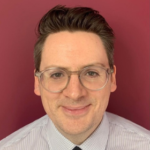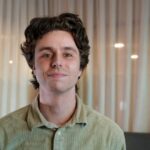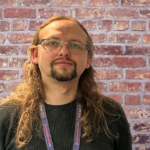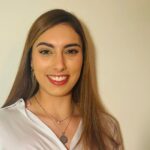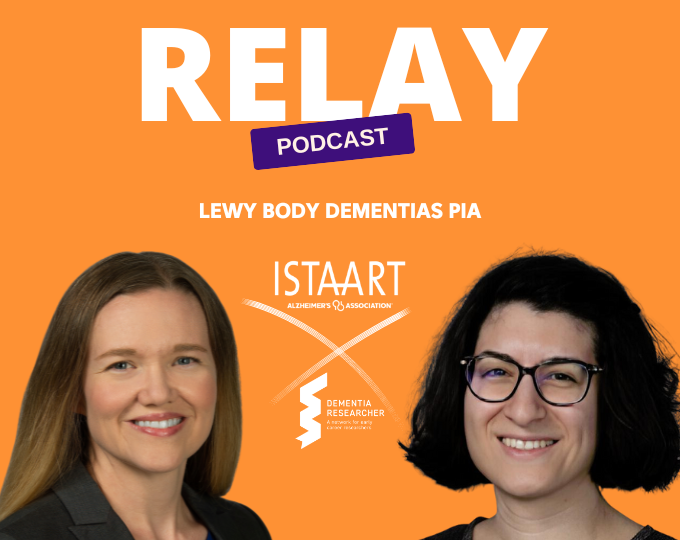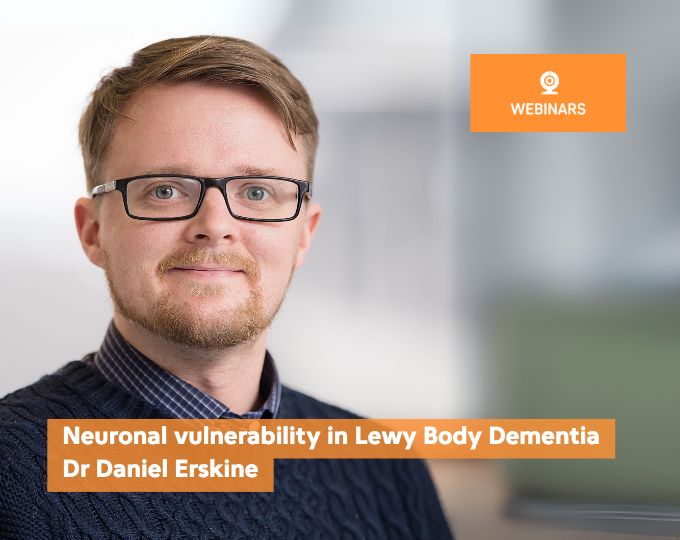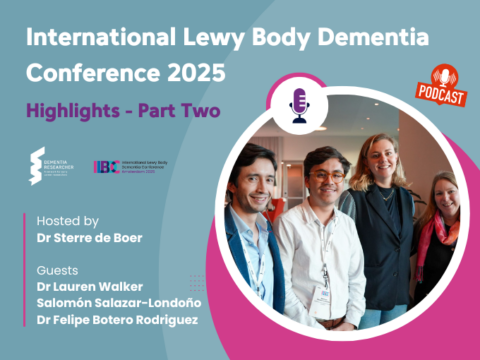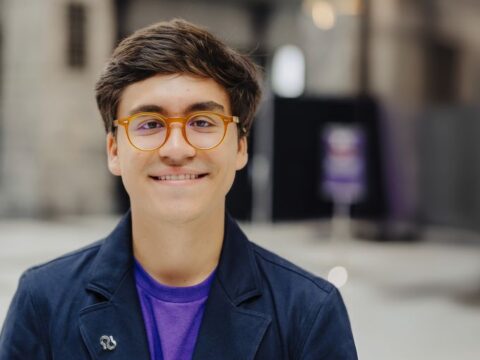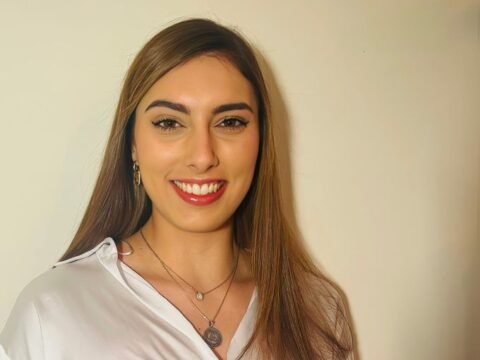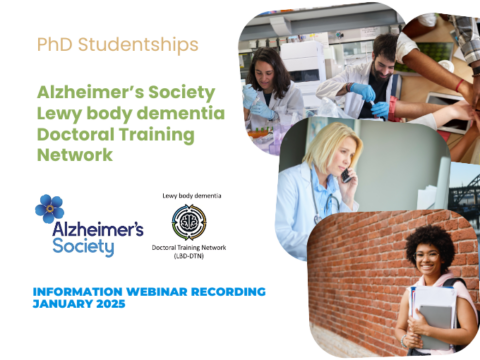Join us for the first of our two-part special podcast shows, recorded live at the International Lewy Body Dementia Conference in Amsterdam!
In this episode postdoc researcher Dr Josh Harvey (University of Exeter) is joined by three expert guests - Athina Grigoriou a PhD Student, University of Dundee, Dr David Koss, Principal Investigator, University of Dundee and Dr Joe Kane a Geriatric Psychiatrist, Queen’s University Belfast. Together, they discuss key highlights from the conference, including cutting-edge research on Lewy body dementia (LBD), Parkinson’s disease dementia (PDD), and synucleinopathies.
Topics include:
• The role of DNA damage in LBD and its links to neurodegeneration
• A new Lewy Body Dementia Domain Rating Scale and its impact on clinical trials
• Advances in biomarkers and imaging for early diagnosis
• The latest insights on alpha-synuclein strains and their role in disease progression
• Carer perspectives and the importance of peer support networks
Voice Over:
The Dementia Researcher Podcast, talking careers, research, conference highlights, and so much more.
Dr Josh Harvey:
Hello and welcome to the Dementia Researcher Podcast. This is the first of two sessions coming to you from the International Lewy Body Dementia Conference here in Amsterdam.
Hi, I'm Josh Harvey. I'm a postdoctoral research associate at the University of Exeter and I'm here today joined with three lovely guests, sharing you the insights from this, the Lewy Body Dementia Research Conference. Obviously, long-time listeners the Dementia Researcher Podcast will know that they cover a number of different conferences over the year, but this is the one specifically focused on Lewy body dementia. For those unfamiliar, Lewy bodies, as they're referred to here, are abnormal protein aggregates in the brain formed primarily of alpha-synuclein. And their buildup is characteristic of a number of different clinical syndromes, namely Parkinson's disease and of interest for us today, Lewy body dementias, which comprise both Parkinson's dementia and dementia with Lewy bodies. Although maybe controversially how distinct these two are under vigorous debate. Without any further ado, I'll introduce my fantastic three co-hosts and panellists for this session. I'll start left to right. I'll start with you, Athina.
Athina Grigoriou:
Yeah. So hi, I am Athina. I am a first-year PhD student at the University of Dundee in Scotland. I work with Dr. Dave Koss, just sitting next to me. Yeah. And my research is on DNA damage in neurodegeneration, specifically in synucleinopathies. I'm trying to find a relationship between DNA damage and synucleinopathies and especially dementia with Lewy bodies, PDD. Yeah.
Dr Josh Harvey:
Fantastic. I guess there's been an initial introduction to your group's work, David.
Dr David Koss:
Sure. Yeah. So hi, I'm David Koss. I'm a relatively new PI at University of Dundee. And primarily, as Athena has already said, we're looking at DNA damage. But actually, we're trying to look at a slightly wider scope of that and look to see whether DNA damage is a common theme across synucleinopathies, also pure Alzheimer's disease and maybe a few other neurodegenerative conditions as well.
Dr Josh Harvey:
Fantastic. And then last but not least, we've got Joe.
Dr Joe Kane:
Thank you. My name is Joe Kane. I am a geriatric psychiatrist, and I work from Queen's University, Belfast. I do research into lots of different types of Lewy body work, but perhaps most relevant to this conference and today in particular has been clinical trials. So, it's great to be here. It's been a great conference.
Dr Josh Harvey:
Fantastic. So, I guess we've got the full remit of research here. We've got core fundamental biology, all the way through to clinical facing. Joe, in that last session there you were sharing some work you were doing, setting up a domain rating scale for Lewy boy dementia. I wonder if you could give us a bit of background on that work.
Dr Joe Kane:
Sure. Well, we've bemoaned the fact that in DLB research we've really relied very heavily on scales that most of the listeners will be familiar with. So, your cognitive scales, but also your global scales like the CDR. We've relied on these scales that were really designed for other disorders. And we have had more than a sneaking suspicion that these scales just don't work in DLB trials and that we're maybe missing signals somewhere. So, over the past couple of years, really since the last conference, we've been running Delphi studies and we've been developing a new rating scale for Lewy body dementia and that's called the LBD DRS. And unlike other dementia scales it has the full range of symptoms that we see in LBD. And it's an attempt to try and get consensus in the community that this is something they should be moving forward with. I was really pleased with the reception that it's got, and it has really motivated us to do more work on this and get it out there.
Dr Josh Harvey:
Mm-hmm. Yeah. It was a fantastic talk. And you mentioned a Delphi consensus there and what the main aim... Could you give us some background on what that actually entails in terms of getting an expert decision on that?
Dr Joe Kane:
Yeah. Really glad you asked that because it's become such a big important part of the field. It's where you really don't have as robust evidence as you would like for treatment or for any complicated or nuanced issue. You can get consensus from a group of experts. And it's the same process by which we would've developed the diagnostic criteria, for example, for DLB.
What you do is you come up with a group of statements, you send them out to the experts, and you ask the experts to what degree they agree with that statement. And if you get lots of disagreement it's very clear you either need to change your question or you need to get some balance between two or more camps. And you keep doing that, you keep refining your question, you keep refining your statement, you keep refining your source materials until usually around 70% or more of people agree with what you're saying.
Dr Josh Harvey:
Right.
Dr Joe Kane:
So, it sounds reasonably easy, but in a really opinionated, well-informed group it's tricky.
Dr Josh Harvey:
Yeah.
Dr Joe Kane:
But we're really pleased that people have contributed to it so much. So, what we expect is we're going to have another few rounds of the survey and that eventually we have at least 70% of people that are happy with it.
Dr Josh Harvey:
Really looking forward to it. And I guess talks weren't the only thing, we were sharing posters and other bits of work at this conference. I wonder if you guys want to go into some of the work you were sharing from your own group.
Dr David Koss:
Sure. So, we had two posters effectively highlighting our research in DNA damage in dementia with Lewy bodies, primarily utilising post-mortem human tissue. And effectively we've found that there seems to be an elevation of DNA damage in the dementia with Lewy bodies, particularly in the neocortex. And then we've mapped that onto pre-symptomatic young age mouse models of the disease and carried on and done some nuclear proteomics work to investigate those pathways that are up or down regulated in response to DNA damage and repair.
We're often actually trying to correlate some of our post-mortem pathology results with anti-mortem cognitive scores. So actually, your work in trying to find a more accurate representation of the disease burden in patients, whilst I think is probably not your driving motivating factor, would actually be something that as scientists we're actually also really interested in. Because then it allows us to try and correlate the severity of our pathology onto something that's actually meaningful.
Dr Joe Kane:
Yeah.
Dr David Koss:
Often, we stay away from things like the, I suppose, MMSE or CDR because actually that doesn't really reflect particularly that well the symptoms that we're seeing in dementia with Lewy bodies.
Dr Josh Harvey:
And I guess always so difficult, you mentioned the post-mortem discovery that you're looking to validate in mice. I guess the snapshot you'll sometimes have a post-mortem from what's available through brain banks, doesn't always-
Dr David Koss:
Sure.
Dr Josh Harvey:
... capture everything.
Dr David Koss:
Yeah. Yeah.
Dr Josh Harvey:
And the whole complex progression of a really complex disease.
Dr Joe Kane:
Oh, without a doubt.
Dr Josh Harvey:
Yeah. So difficult. I completely agree. Yeah. [inaudible 00:07:31] and like you said, translating it through to animal models as well, getting that multifaceted approach-
Dr David Koss:
Sure.
Dr Josh Harvey:
... so, you can get insight into that early process.
Dr David Koss:
Yeah.
Dr Josh Harvey:
No, great.
I guess we'll move on and talk about research highlights outside of our own work. So, I was interested in how everyone found the conference, what was some core takeaways, and what was most exciting stuff you saw on display?
Athina Grigoriou:
Yeah.
Dr Josh Harvey:
Start with you, Athena.
Athina Grigoriou:
Yeah. Sure. Thank you. So as a first-year PhD student it was my first international conference. So, it was really exciting to see the talks, the research out there. And, yeah, it was really interesting for me. And even though it was somehow more clinical than the fundamental biologists that we are, I found really interesting to see how all of these people work together to bring basically a better outcome for the patients and everyone.
So, there was a talk that was really interesting, I was really excited when I heard it and also poster that somehow contradicts but also agrees with the results. So, it was the talk from Shady Rahayel. Forgive me if I misspoke that. And it was basically the phenoconversion of the isolated REM sleep behaviour disorder using free water imaging. So, some of the key takeaways from that, it was how basically free water was increased in the basal forebrain that indicated basically a higher risk in developing dementia with Lewy bodies. And that was more widespread, let's say, in the whole brain. So, it was widespread in the whole brain. And I also talked with Shannon Chiu, who's also working with JD. And they found that, yeah, free water is widespread, whereas, for example, in Parkinson's disease more located in the substantia nigra.
However, when I looked at a poster that was really interesting and it was from Julia, she's a last year PhD at the University of Sheffield. Using MRI again, she was looking at atrophy though and she saw that the atrophy was spread out in the Alzheimer's disease but was more specific in dementia with Lewy bodies, was quite the opposite to what they saw with-
Dr Josh Harvey:
[inaudible 00:09:56].Athina Grigoriou:
It was [inaudible 00:09:57] whereas in the cortical thinning it was the opposite. So basically, so in dementia with Lewy body it was more spread, whereas in Alzheimer's disease it was more located. I can't really remember the specific location. But, yeah, so those were the two most exciting things. It was really new for me as well as I wasn't working with imaging or-
Dr Josh Harvey:
Yeah. Definite, a lot of-
Athina Grigoriou:
It was so great.
Dr Josh Harvey:
... from the imaging field. And you mentioned that first study there was around conversion from REM sleep behaviour disorder was that-
Athina Grigoriou:
Yeah. Yeah. Yeah. That's the, yeah, to... Well, they mentioned DLB and PD. So yeah.
Dr Josh Harvey:
It's interesting.
Athina Grigoriou:
Yeah.
Dr Josh Harvey:
It's been a very hot topic, I think, at this particular one about as a prodrome or symptom to both PD and DLB.
Athina Grigoriou:
Yeah.
Dr Josh Harvey:
Do you think maybe some of those differences between what they report in their free water imaging and maybe some of the other imaging-based studies might be down to when you look in the timeline of pathology or is it-
Athina Grigoriou:
So, I asked the same question to Shannon. I was talking to her in one of her breaks and she said that they still haven't looked at the PDD cases because of the really vast and broad spectrum of these diseases. But she said that they just started looking at these cases, but she sees the same parts in a DLB. So, they still can't identify what it is. But, yeah, I can't really... Yeah.
Dr Josh Harvey:
Guess that's the question everyone's [inaudible 00:11:28].
Athina Grigoriou:
I can't really say. Yeah.
Dr Josh Harvey:
How about you, David? Any highlights that come to mind?
Dr David Koss:
Yeah. Sure. Actually, just to stay on that image [inaudible 00:11:37]. I think what was really interesting is we saw a few presentations back-to-back looking at both in terms of cortical atrophy but also in terms of changes in FDG, right? So actually, brain metabolism. And to me it seemed clear that there was this massive mismatch between actually where the cells are dying and where there is this hypometabolism that's occurring. So, this is an interesting link because often when we're talking about dementia with Lewy bodies we say, "Of course it's a neurodegenerative disease." But it's not characterised by a huge loss in brain weight at end stage. So, it's clearly there's a very subtle thing that's happening here. And actually, the changes in FDG are probably suggesting some form of cellular dysfunction rather than a cellular loss. And it would be something I'd be really interested to speak to some neuroimaging people to clarify exactly how they explain the mismatch. Mm-hmm.
Dr Josh Harvey:
Yeah. That's interesting. Yeah. That might speak to different selective vulnerabilities as well, right? If some cells can withstand higher metabolic burden maybe they survive for longer just because they have that robusity.
Dr David Koss:
Sure. Yeah. Yeah. Absolutely.
Dr Josh Harvey:
Was interesting.
Dr David Koss:
But actually, I suppose, more in line with some of the work that I'm directly involved in or interested in, I was really interested in Amanda Woerman's keynote speech. She's from Colorado State. So, she was effectively looking at alpha-synuclein as prion strains. She's using both a mouse model as well as a particular cell line. And she was testing the ability of brain lysates from multiple systems atrophy or dementia with Lewy bodies or Parkinson's disease to effectively induce alpha-synuclein pathology when administered to mouse models. And I think that's something that several groups have been working on. It was interesting, in her hands, in her setup she actually found that it was only really the MSA brain lysates that were able to induce this. And this is already giving rise to that idea that although we're seeing the pathology of alpha-synuclein, the ability of different strains to infect seems to be different between the diseases.
But her work was actually far much more nuanced than that in that she was taking this MSA strain, applying onto cell lines that were expressing different mutations. And she was able to show that those brain lysates were able to infect a whole host of cell lines, that actually if she then took that sample and put it into a mouse, and then after pathology developed in the mouse, she was then able to take that mouse brain extract and apply it onto the same cells. It actually narrowed down an effective profile. So, they were only then able to cause seeding and templating in, say, one or two different cell types.
And I think that's really interesting because it was effectively getting to the heart of the fact that the disease itself, either MSA or DLB or Parkinson's disease probably contains multiple different infective strains. And by putting it into a mouse model you're effectively amplifying up those that are most aggressive in that system and they're becoming the dominant species that's present in the brain tissue. Yeah. I think that probably holds quite a lot of importance if we're thinking about monoclonal antibody therapies, specifically about trying to target individual diseases or synucleinopathies as a whole.
Dr Josh Harvey:
A one-size-fits-all approach might not be the way to go, I guess, if there's very different and distinct changes that occur with one strain versus than another. I had also thought her talk was fantastic and thought it was very cool. One bit where a PDD patient lysate that she'd found was performing like her multiple system atrophy species.
Dr David Koss:
Yeah.
Dr Josh Harvey:
They went back to the pathology and restained it turned out there was-
Dr David Koss:
Yeah.
Dr Josh Harvey:
... if I'm understanding it, glial pathology there, which might explain that different capacity.
Dr David Koss:
Yeah.
Dr Josh Harvey:
Always very cool when there is back and forth there.
Dr David Koss:
Yeah. I'm not really sure what the key differences are between her work not seeing amplification with DLB or PD, but for sure we have this belief that the alpha-synuclein pathology strains in MSA are far much more infectious and behave more in line with prions than, say, with Parkinson's disease or dementia with Lewy bodies.
Dr Josh Harvey:
Mm-hmm. Yeah. It's fascinating.
Dr Joe Kane:
I'm really interested to know if that was deliberate on part of the conference organisers where that was the keynote speech on the first day. And it feels like it was almost like a theme throughout the rest of the nuance discussions throughout was strains.
Dr Josh Harvey:
Mm-hmm.
Dr David Koss:
Yeah.
Dr Joe Kane:
Now we obviously haven't joined the dots between the mechanistic differences, but it's been very clear to us for a long time that all of our clinical data is really noisy and messy and doesn't seem to add up. And there were more than a few presenters that pointed towards somewhat incongruent results be it an alpha-synuclein seed assay result that wasn't expected or didn't fit with our current model of understanding. And the conclusion was maybe there's something in this strain thing. And for me it was the strange, it's probably the biggest takeaway from the conference in terms of the conversation that slipped from the basic science sphere into the translation and the clinical sphere. And really interested to see how it develops over the next few years. Yeah.
Dr Josh Harvey:
Yeah.
Athina Grigoriou:
Yeah.
Dr Josh Harvey:
Likewise.
Dr David Koss:
And actually just... Do you want to say something?
Athina Grigoriou:
No, no, I agreed with what you just said on the strains, to be honest. Yeah.
Dr Josh Harvey:
Mm-hmm.
Dr David Koss:
And what I felt was interesting, specifically when we're talking about that ability to template and misfold in in vivo or in a cell system seems that MSA seems highest. And something that I didn't appreciate is that in the seed amplification assays, it's reversed.
Dr Josh Harvey:
Yeah.
Dr David Koss:
So, the MSA cases don't seem to actually seed as much. So, I know that maybe doesn't necessarily translate to a meaningful thing in the clinic. So also, I think that highlights that definitely there is those individual strains.
Dr Josh Harvey:
Yeah.
Dr David Koss:
And that's something that needs to be considered.
Dr Josh Harvey:
Yeah. Definitely. And I guess there's been a few talks that look at this from different levels. Those strains, I guess, on the pathological alpha-synuclein side and there's people who are looking at determining the subtypes of disease using a number of different approaches. I wonder, in the future as we begin to align these, whether one subtype might be related to one specific strain and back and forth. It'll be very interesting to see how well these recapitulate each other.
Dr David Koss:
Yeah.
Dr Josh Harvey:
Anyway, Joe, what about you? Any specific standouts?
Dr Joe Kane:
On a similar point to the idea of different phenotypes and different subtypes. I just found the plenary this morning by Per Borghammer absolutely phenomenal. He's probably more closely related to Parkinson's world than the DLB, but he was discussing the brain-first and the body-first hypothesis of PD and LBD. And some of these ideas aren't that new. We've always talked about this idea of body-first pathology, you see pathology in different parts of the peripheral nervous system migrating up towards the brain. And then that became a bit unfashionable once we realised that not everybody fit into that. And what he did was really, really set out the evidence so clearly that these are two phenotypes. And he was able to provide not only gross epidemiological figures for be saying, well one third of people with Parkinson's disease have body-first disease, whereas two thirds of people with Lewy body dementia have body-first disease, which is a bit counterintuitive.
Dr Josh Harvey:
Yeah.
Dr Joe Kane:
And then he also put forward this really interesting hypothesis as to why those people who have body-first disease seem to do worse with respect to cognition function. And the big enduring image for me will be his last slide in which he put a four quadrants up. And one of the dimensions was Alzheimer's pathology, which we're definitely used to discussing on how that influences the expression of Lewy body pathology. But then on another dimension he had the brain-first, body-first and how that might influence four entirely different presentations. And that speaks to what we've always seen and what our patients have always told us is that these are very different experiences and disorders that end up going to very different health systems. But to suggest that they are arising from two dimensions in Alzheimer's pathology and body-first PD was just fascinating and challenging. And I've never seen so many phones go up and take the grid.
And he had previously supported it with lots of data, but he also sent us away with something which was really challenging and made us really think. And actually, what was then proposed was that it might end up at six boxes at some stage. But either way it reflects the fact that clinically this is a very heterogeneous group of disorders.
Dr Josh Harvey:
Yeah.
Dr Joe Kane:
And to think that these are all represented by the same pathological process has always been a bit puzzling.
Dr Josh Harvey:
Yeah.
Dr Joe Kane:
The other thing that I really liked that he did is he basically put, for his last, last slide, his acknowledgments. His last, last slide is basically like an infographic. It's like, "Here's everything I've done in my talk"-
Dr Josh Harvey:
Yeah.
Dr Joe Kane:
... "squeezed in place."
Dr Josh Harvey:
Yeah.
Dr Joe Kane:
So, for all those people that had missed the slides, they got all the slides together in context at the end. So, I think I'm going to steal that in the future. Yeah.
Dr David Koss:
Yeah. Yeah. And it was a really powerful talk, I think, and really, really engaging. We were both really excited about the way was-
Athina Grigoriou:
I was taking pictures all the way.
Dr David Koss:
Yeah. Just the way it was presented. And I think it is one of these things I probably need to go away and have a hard think about really to really see if I 100% agree with what you're saying or whether the evidence holds up. But absolutely brilliant.
Dr Josh Harvey:
It definitely felt like a convincing presentation, even right at the beginning where he had a slightly different two-axis plot, but he had the autonomic symptoms as measured by the invisible heart kind of phenotype.
Speaker X:
Yes.
Dr Josh Harvey:
And then the dopaminergic degeneration phenotype along the bottom. And you have those two groups already clustering out.
Dr David Koss:
Yeah.
Dr Josh Harvey:
Even just looking at those two dimensions.
Dr David Koss:
Yeah.
Dr Josh Harvey:
It was very, very, yeah, exciting.
Dr Joe Kane:
So fascinating as well because I did my PhD and that heart imaging, the MIBG, and we were really excited because we thought it was going to be a really good early biomarker. And then we compared it against something like a DaTscan. During my PhD I compared it just in terms of diagnostic test terms. And the answer was it's all right, but it's not as good as a DaTscan. So that felt like the end of the conversation. But now we're hearing-
Dr Josh Harvey:
Yeah. [inaudible 00:23:31].
Dr Joe Kane:
... MIBG that we can do. This isn't like RT-QuIC that is related to a few isolated labs across the place. We can't do this imaging. And there's a suggestion from his talk that in people with body-first that 90% of those have an early abnormal MIBG heart scan. Some of the work from the Newcastle group on prodromal DLB and MIBG prodromal DLB, it doesn't seem quite just... It's good for ruling in, not great for ruling out. And again, speaks to these are different phenotypes.
Dr Josh Harvey:
Yeah.
Dr Joe Kane:
And for him to crystallise it in the way he did using the breadth of data, he had AI stuff in there, imaging stuff in there, he integrated the genetic markers into that grid. So, it was really convincing and persuasive argument.
Dr Josh Harvey:
Yeah. Definitely.
Athina Grigoriou:
I was also going to highlight on the data and then all the other things he used, like you just said imaging, post-mortem, he used even models like mice models and mice brains. It was really interesting. So, like you said, he just had the data there. It's like, "Look, I know what I'm talking about."
Dr Joe Kane:
Yeah.
Athina Grigoriou:
Yeah.
Dr Josh Harvey:
Yeah. Yeah. Every sort of level backed up. Mm-hmm.
Athina Grigoriou:
Yeah. Exactly.
Dr Josh Harvey:
Mm-hmm. Mm-hmm. It was very, very interesting. Yeah. Back over to you, Athina. Any other highlights from the past few days?
Athina Grigoriou:
Well, it's a bit out of the science world, let's say, it was about the carers. So, there were so many posters, especially today, last day, about the people who are looking after the patients with dementia, with Lewy bodies or Parkinson's disease, especially with dementia with Lewy bodies. And I had a talk with a woman who she actually lost her husband through dementia with Lewy bodies, and it was actually a really, really fast instance. So, two years after he got diagnosed, he passed away. And it was really interesting to hear how... Well, what these people are going through. And it's not just the patient, it's also the carer because she was saying to me how she was trying to improve the quality of life for her husband. So, she was taking him out for a walk and was trying to play games with him and just to keep him alive. And it was really, really nice to hear and all the stories and what they do. And also, I think they also conducted a study with carers, and they found out what are we lacking in this sector? So, what are these people need?
Dr Josh Harvey:
Yeah.
Athina Grigoriou:
Found actually that even the clinicians that are working in this sectors, they've got no clue how to diagnose it. It's all DLB. They found that there is a lack of support out there. And they found that there's mental instability for the carers as well. Yeah. And it was just two old ladies doing it. So that was really, really touching, to be honest, for me. So, it was really good to see that, that it was included in this conference as well. It's just not about the science, but was also about the people, about taking care of those diagnosed. Yeah.
Dr Josh Harvey:
Joe, I see you're...
Dr Joe Kane:
Just on that, I don't know if you saw the talk earlier on today from Leah Forsberg and the Mayo Clinic where a really novel idea of-
Speaker X:
Yeah.
Dr Joe Kane:
She built an algorithm but in a Tinder type way.
Dr Josh Harvey:
Yeah.
Speaker X:
Yeah.
Dr Joe Kane:
Matched up care partners-
Athina Grigoriou:
Yeah.
Dr Joe Kane:
... of people with LBD to find the right match.
Athina Grigoriou:
Yeah.
Dr Joe Kane:
And one of our colleagues from Southampton, Jay Amin, made a really good point that we don't really have good support systems in the UK at least.
Dr David Koss:
No.
Dr Joe Kane:
We give people a little bit of information. We might direct them towards local services, but they're very seldom tuned in to the real challenges of Lewy body dementia. So, to have this, which is seemingly working almost autonomously, to link people up with the people with whom they can touch base. And it's effectively peer support.
Dr Josh Harvey:
Yeah.
Dr Joe Kane:
And although it does lose a little bit of the human touch in somebody coordinating it, I thought it was just a really inventive way to get people connected.
Dr Josh Harvey:
Yeah.
Dr David Koss:
Yeah.
Dr Joe Kane:
And I strongly suspect that's the type of thing that made a big difference in people's lives.
Dr David Koss:
Yeah. If I can just speak a tiny bit about my own personal experience. So, I've recently been caring for my mum who's had Alzheimer's disease. And often I've been looking for peer support but actually being paired up with someone who's at the same stage of my life is actually very difficult. Because actually typically it tends to be people that are slightly older and often its partners caring for their husband or their wife. And actually, it would've been really good for me, I think, if there'd been someone that could have been personalised and selected for that. Because certainly going through that process, I definitely was in need of some kind of peer support.
Dr Joe Kane:
Yeah.
Dr David Koss:
So that's why it really struck a chord with me is this idea. And the good thing about that app is it doesn't have to be local. Maybe it would be ideal if it's local.
Athina Grigoriou:
Yeah.
Dr David Koss:
But if there's particular demographics that is slightly rarer to pair up.
Dr Joe Kane:
Yeah.
Dr David Koss:
You can go as far as you want in terms of covering that. So again, it was interesting. And of course, they're still looking for participants [inaudible 00:29:29]-
Dr Joe Kane:
Yeah. Yeah.
Dr David Koss:
... be based in the US.
Dr Joe Kane:
Yeah.
Dr David Koss:
[inaudible 00:29:32].Dr Joe Kane:
I thought it was really interesting that one of the things that wasn't important in selecting peer support was the distance.
Dr David Koss:
Yeah. Yeah. Yeah. Yeah. Yeah. Yeah.
Dr Joe Kane:
And as we've all moved virtually and all more used to communicating via our phones and everything else, you'd like to think it would get even easier-
Dr David Koss:
Yeah.
Dr Joe Kane:
... for most of us.
Dr David Koss:
Yeah. Yeah. Absolutely. And really nice, totally different take-
Dr Joe Kane:
Yeah.
Dr David Koss:
... to give a talk at the conference as well.
Dr Joe Kane:
Yeah.
Dr David Koss:
I guess when we were talking about the involvement of carers, and I know there is a Carers Day that's happening tomorrow as well. But I think what's been good about the conferences in the past has been that these events not only serve as a hub for us as scientists, but it also serves as a hub and a support structure for those that are undergoing either the disease or caring for someone with these diseases. And I really hope to see that maybe the next time this is happening that there's a really strong representation for that.
Dr Josh Harvey:
Yeah. [inaudible 00:30:39]. It's a central context, isn't it? It's very easy to feel a million miles away, especially if you're more post-mortem or discovery biology kind of stuff. You can sometimes lack that kind of immediate meaningfulness about what people living with these conditions is like.
Dr David Koss:
Yeah.
Dr Josh Harvey:
But on the first day there was a really touching moment where someone was presenting around autonomic symptoms and early, I believe, it's cardiovascular aspects of the disease and someone who was a carer came to the mic and spoke to what they were presenting from a broader kind of research perspective really rang true to their own experience caring for their partner.
Dr David Koss:
Yeah. Sure.
Dr Josh Harvey:
I thought it was, like you said, it's great to have that kind of mix of researchers and carers in the setting.
Dr David Koss:
Yeah. Yeah. Yeah.
Athina Grigoriou:
And the video they showed as well, Face Wind, I think.
Dr Joe Kane:
Yeah. I never even got a chance to go and see it actually. Yeah.
Athina Grigoriou:
Really good. Well, it's what you said about, we live in a world that's all digital. So, it's really easy to communicate with anyone we want. So, it was mostly women who were taking care of their husbands.
Dr Joe Kane:
Sure.
Athina Grigoriou:
Again, with dementia with Lewy bodies. And there was one of them, she was really distinct, she was crying, and she said, "I can't take this anymore, I'm not as strong as you girls," and whatever. But then through Teams they came in contact and then they also had a day that was just for them.
Dr David Koss:
Yeah. Brilliant.
Athina Grigoriou:
Yeah. So, they all come together, they went on field trip actually. And then they organised other activities with their husbands. So, they all come again together, and they started talking. So that was really fascinating to watch.
Dr Josh Harvey:
Definitely.
Athina Grigoriou:
Yeah. So, it adds up everything you said as well.
Dr Josh Harvey:
No, I also found that trailer really interesting. I don't know if we can link it in the show notes or anything, but I would definitely like it.
Speaker X:
[inaudible 00:32:28]. Yeah.Dr Josh Harvey:
Yeah.
Dr David Koss:
Yeah. That's a good point. Yeah. Yeah.
Athina Grigoriou:
Yeah.
Dr Joe Kane:
My first International Lewy Body Dementia Conference long, long time ago. But as a first year PhD student at that, it's really easy to feel overwhelmed. There are loads of people here saying, "I didn't miss a talk because it touched every area." But as someone new to the field that can be really, really overwhelming. And I remember what was really helpful and centering and motivating was stepping out of the scientific talks when I got overwhelmed and reminding myself why I was doing it in the first place. So, I agree, I think it's great, but I would love them to be parallel.
Dr David Koss:
Yeah. Yeah.
Dr Joe Kane:
And I know they've done that in previous years. I would like to see that again.
Dr Josh Harvey:
Yes. Yeah. Yeah, I agree. I agree.
Dr David Koss:
I think the other thing that we have to talk about is the Rising Star Award.
Dr Joe Kane:
The Rising Star.
Athina Grigoriou:
Yeah.
Speaker X:
[inaudible 00:33:32].Dr Joe Kane:
Who was it that won the Rising Star award?
Dr David Koss:
You remember. So, someone never heard of.
Dr Joe Kane:
So, yeah, [inaudible 00:33:41]. It was absolutely well-deserved.
Dr David Koss:
Brilliant.
Dr Josh Harvey:
It's really appreciated. Yeah. And an honour to be included with so many other great researchers. So, three pre-clinical, three clinical, and a good few of them were presenting and sharing stuff and it was all, yeah, brilliant.
Dr David Koss:
Yeah. I was-
Dr Josh Harvey:
Feel very blessed.
Athina Grigoriou:
Well done.
Dr David Koss:
Yeah. Yeah. I was hearing that you clearly didn't really fancy your chances because... So, a friend of mine was kind of looking at the screen and looked over knowing where you were, and you were still looking at your-
Dr Josh Harvey:
Yeah. I didn't know. I wasn't faking being gracious or anything. Yeah. Danny and I had no idea. [inaudible 00:34:21]. But yeah, very nice surprise. Definitely.
Dr David Koss:
Do it for the podcast, would you say he's a shade of dark red there or...
Dr Joe Kane:
Or is it just... Yeah. Yeah. Slightly dark [inaudible 00:34:32], but his head has swollen.
Dr David Koss:
Just a tiny bit.
Dr Josh Harvey:
I appreciate you guys bringing it up because, yeah, clearly, I'm very comfortable I'm sitting there and [inaudible 00:34:40]. Anyway, moving swiftly on, any other research highlights, any other cool [inaudible 00:34:48] that stand out?
Dr David Koss:
Yeah. So, it's not really my specialty, but I was particularly interested in some of the data from GWAS studies that was... And I believe this is right, I had a problem with a lot of pens at this conference, so my notes weren't actually that brilliant. But I believe they conducted it on isolated RBD cases.
Dr Josh Harvey:
Yes.
Dr David Koss:
Which again, it was another common theme of the conference, which is that RBD is almost a clever way of having a catch-all to start with because many of them, up to 90%, will go on to develop either Parkinson's disease or dementia with Lewy bodies. So, you get in there early and are able to increase your statistical power by the fact that you have this common-
Dr Josh Harvey:
Exactly. And a real specific signal, I thought that talk was fantastic as well.
Dr David Koss:
Yeah. Yeah.
Dr Josh Harvey:
This is Emma Somerville; I think her name [inaudible 00:35:42].
Dr David Koss:
Yeah. Yeah. That's [inaudible 00:35:43], correct. Yes. Yeah. From Montreal.
Dr Josh Harvey:
Yeah. Montreal.
Dr David Koss:
Yeah.
Dr Josh Harvey:
Montreal. Right country, wrong place.
Dr Joe Kane:
Yeah. Yeah. Yeah. Close enough.
Dr Josh Harvey:
Yeah. I thought it was really cool. Those RBD GWAS are really interesting because they flag up a lot of the same genes as DLB and PD, right?
Dr David Koss:
Yeah. Yeah.
Dr Josh Harvey:
It's standout GBA, SNCA-
Dr David Koss:
Yeah.
Dr Josh Harvey:
... always there, but she delved into this new locus, I think it was near this gene Rcor1.
Dr David Koss:
Yes.
Dr Josh Harvey:
And really from everything she showed from comparing to other GWAS, it seemed to be quite distinct from the signal in PD, DLB, AD. From what I could interpret, it seemed to be a real novel and distinct signature of RBD, which I thought was-
Dr David Koss:
Right. Yeah. Yeah.
Dr Josh Harvey:
... quite interesting. I guess there's tonnes of work to be done to figure that out.
Dr David Koss:
Yeah. Yeah. It was interesting. Again, we're assuming that it affects this gene or maybe I am. And so of course I was just Googling what this gene is involved in. And it seems like it's a transcriptional repressor of neuronally expressed genes, which I think was really, really interesting. This is typically active in non-neuronal cells for this. But I'd be amiss if I said there wasn't evidence to suggest has a role in DNA damage repair, which I was interested to see.
Speaker X:
[inaudible 00:36:58].Dr David Koss:
And I know that there's perhaps some growing evidence in other genetic studies that there are implicating some DNA damage repair pathways or genes as risk factors for Parkinson's under specific environmental settings as well. So, it was interesting to see that. And often actually having a look at some of the GWAS studies for DLB or for Parkinson's, you often get these genes that are not quite meeting the statistical cutoff point. But I think at this stage, because we're still so limited in the numbers that we're using for these investigations, there's still a lot of work to look at those slightly near significant hits as well, right?
Dr Josh Harvey:
Yeah. Yeah. Yeah. That was also a core highlight. Yeah.
Dr David Koss:
Yeah.
Dr Josh Harvey:
It was very close to in the previous study, but hadn't quite-
Dr David Koss:
Yeah.
Dr Josh Harvey:
And just those extra samples just nudged it over.
Dr David Koss:
Yeah.
Dr Josh Harvey:
Yeah. Agreed.
Dr Joe Kane:
Absolutely.
Dr Josh Harvey:
Definitely plenty to be delved into.
Cool. So, this is the eighth annual ILDBC and I think you said this was your first one.
Athina Grigoriou:
Yeah.
Dr Josh Harvey:
I think you were both at the previous one in Newcastle.
Dr Joe Kane:
Yeah. Yeah.
Dr Josh Harvey:
I'd be interested from you two, what's changed in the field since the last one? What stands out as new and maybe not new and then we can maybe talk about how we think will change in five years time. So first, over to perspectives from the last one.
Dr Joe Kane:
Well, the thing that was really talked about last time was really cutting-edge last time was, it was the first time we were talking in detail about RT-QuIC, about these synuclein seeding assays. And since then, we've learned about data from lots of longitudinal cohorts from some of the larger consortia. And what's quite clear, especially with the fact that it's been commercialised, is when we talk to our American colleagues, they have integrated this tool into much of their routine clinical practise and they're using it pretty frequently and they're seeing where it makes sense and where it doesn't make sense.
Dr David Koss:
Right.
Dr Joe Kane:
So, it's quite nice to see something go from the new kid on the block to see something which is really tested in the field. Now, I would say that there's nice data that's come from it, which yes, it's sensitive and specific for CSF, but with surprising lack of specificity in particular with the skin samples and things like that.
Dr Josh Harvey:
Yes.
Dr Joe Kane:
And you also saw some criticisms of it as well in that it's a very binary tool. It's a yes or a no, rather than giving you any quantification [inaudible 00:39:58] when you're doing pathology. So, it's nice just to see those conversations develop. It's nice to see where the Zeitgeist has weaknesses, but I don't think it's going anywhere. I do think it's going to become as just seen with the staging, the different staging systems that have been proposed. It's probably here to stay the time being and it's probably something we're going to have to get used to. So that's the big difference for me. And in a relatively short space of time, that's been a big jump.
Dr Josh Harvey:
Mm-hmm. Mm-hmm. Yeah. Definitely. It's very present at the moment. It is exciting to see it in clinical practise now. David, any thoughts from previous years?
Dr David Koss:
Yeah. Well, I'll pick up a little bit from what you were saying about the seed amplification assay, which was that there was also the presentation of a new modified seed amplification amino assay, which was from Omar El-Agnaf. And I guess this is almost as a potential, again, to be as revolutionary, right? So, it has better detection and actually better specificity when it comes to skin samples and various other things. And the critical point of this is that it's actually quantifiable as well. So, you can then start comparing the levels of, I suppose, seeding rather than just this binary yes or no.
Dr Joe Kane:
Yeah.
Dr David Koss:
That was one thing that I noticed. I think actually the biggest thing for me was the representation of REM sleep behaviour disorder as an isolated phenomenon and using that as specifically, as you said before, well-defined cohorts to really look at in many different aspects as well. I don't think that was something that was particularly touched about too much in Newcastle two years ago. Yeah. Yeah.
Dr Joe Kane:
I think that's fair. I think previous congresses have really... At the previous congress before that in which REM sleep behaviour disorder was integrated into the diagnostic criteria.
Dr David Koss:
Sure. Yeah.
Dr Joe Kane:
So, it's definitely something that's been out there, but fact they've been able to really, really well-characterised those cohorts.
Dr David Koss:
Yeah.
Dr Joe Kane:
They've been able to do FDG-PETs, they've been able to do MIBGs.
Dr David Koss:
Yeah.
Dr Joe Kane:
They've been able to do the RT-QuIC, the seed amplification assays. And it always feels a bit foreign to me because it's not something which is well-recognised in the UK practise because it's not really that well-developed especially. So, sleep medicine is there. Yes, I recognise RBD, but it's usually in people who have other DLB symptoms going on as well.
Dr David Koss:
Yeah.
Dr Joe Kane:
So yes, it's really exciting to get exposed to that data because the clinic isn't producing any hypotheses around that for me. The data has to.
Dr Josh Harvey:
Mm-hmm. Absolutely. And I guess the final point, with fresh eyes, I guess, Athina. Given this is your first one, where do you think the field's moving forward? Five year's time when we meet again for the next LBDC, what do you think?
Athina Grigoriou:
Right. So, at top of my head, what I can think now is trying to find the difference between PDD, DLB and trying to... Yeah. But I think looking from the GWAS studies and everything, I think it's just bringing different scientists [inaudible 00:43:28] for example, fundamental scientists together with clinicians and just trying to find the root cause of these diseases and also how they spread and where they come from. So, for example, like we said, body-first or brain-first. So, I think that will gain much attention as well. And they're going to keep looking for more as just the root causes of this spread. Yeah. I think.
Dr Josh Harvey:
Definitely. I think, yeah.
Athina Grigoriou:
Yeah. [inaudible 00:43:57].
Dr Josh Harvey:
[inaudible 00:43:57] across every single level. Yeah.Athina Grigoriou:
Yeah.
Dr Josh Harvey:
Yeah. No, definitely probing into that heterogeneity and [inaudible 00:44:03]-
Athina Grigoriou:
And especially after the strong data that people showed out there when it came to... Yes. Because we had the, oh my God, the debate. Sorry. Yeah. So, we had the debate about whether the PDD or the DLB are different or the same and they should go under the same umbrella, let's say. So, I guess that will be the way to go. Yeah.
Dr Josh Harvey:
Definitely. How about you guys, future perspective?
Dr David Koss:
I think that it's slightly difficult to predict. I see there being more and more emphasis on the fact that for a lot of the cognitive symptoms that we're seeing are perhaps being driven by concomitant Alzheimer's pathology. That seemed to be another common thing. And it wasn't necessarily directly proven, but it was just as a thought on it, is that really the presence of amyloid was actually the thing that seemed to dictate whether there was a cognitive impairment or not. And then actually the magnitude of tau pathology seemed to drive that. And I think that that's fine in one sense because I'm quite sure that they're modifying what's underlying this, if it's a synuclein disruption that's potentially causing that. I think that's likely. And then these two things, they're adding on top of that to really bring out that phenotype, if you like. I guess we're going to see more and more of that.
Dr Josh Harvey:
Yeah. Absolutely.
Dr Joe Kane:
I just think we're working better together. I think from a trial’s perspective, I think we're better tuned into the conversations about measurement, about characterization of cohorts, and we have better mechanisms of working together and getting in contact with potential participants than we ever were before. And although there are disappointing results from the neflamapimod, the RewinD that was presented earlier on today. It was that big recruitment in a short period of time and this biomarker enriched cohort. And yes, it's used CDR and other scales like that, but I just think we've made strides there in the conversation and I think we'll continue to make strides over the next few years. Maybe not two, maybe not three, but five would be really nice to see some better treatments for people with Lewy body dementia.
Dr Josh Harvey:
Yeah. Definitely agree. Lots to be hopeful for.
Well, I'm afraid that's all the time we have time for today. But I'd like to thank our brilliant guests once again, Athina, David, and Joe. If anyone wants to check out talks or look at any of the details of what we discussed, there's a conference website, ILBDC, that you can check out online. I'm sure it'll be in the show notes. And you've been listening to the Dementia Researcher Podcast.
Voice Over:
The Dementia Researcher Podcast was brought to you by University College London with generous funding from the UK National Institute for Health Research, Alzheimer's Research UK, Alzheimer's Society, Alzheimer's Association, and Race Against Dementia. Please subscribe, leave us a review, and register on our website for full access to all our great resources. dementiaresearcher.nihr.ac.uk.
If you would like to share your own experiences or discuss your research in a blog or on a podcast, drop us a line to dementiaresearcher@ucl.ac.uk
Did you know... you can find our podcast in your favourite podcast app on mobile devices, and our narrated blogs are also available as a podcast.
The views and opinions expressed by the host and guests in this podcast represent those of the guests and do not necessarily reflect those of UCL or Dementia Researcher
We’d like to extend our gratitude to the organisers of the International Lewy Body Dementia Conference for kindly providing a complimentary ticket to attend the event. Their support made it possible for us to bring insights from leading researchers to our listeners. However, the content of this podcast remains entirely independent, reflecting the honest views and discussions of our guests.

 Print This Post
Print This Post